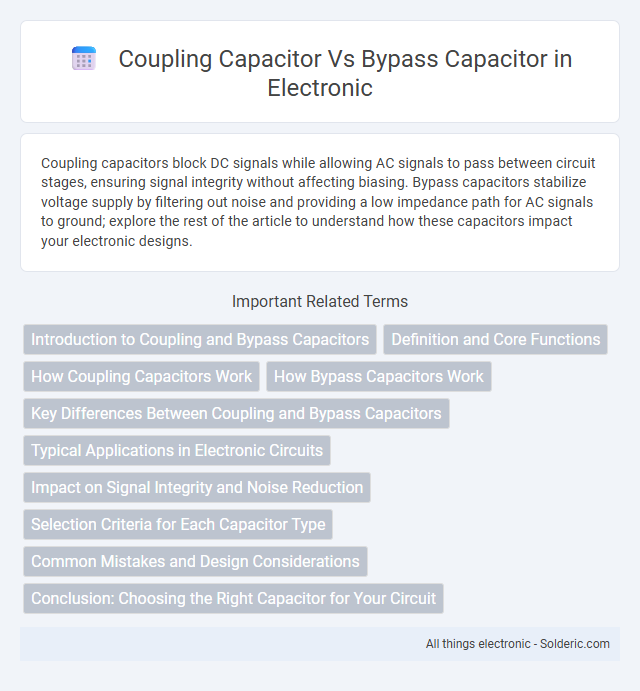Coupling capacitors block DC signals while allowing AC signals to pass between circuit stages, ensuring signal integrity without affecting biasing. Bypass capacitors stabilize voltage supply by filtering out noise and providing a low impedance path for AC signals to ground; explore the rest of the article to understand how these capacitors impact your electronic designs.
Comparison Table
| Feature | Coupling Capacitor | Bypass Capacitor |
|---|---|---|
| Purpose | Blocks DC, passes AC between stages | Stabilizes voltage by bypassing AC noise to ground |
| Location in Circuit | Between amplifier stages or signal paths | Connected parallel to power supply or emitter resistor |
| Frequency Response | Allows AC signals, blocks DC components | Filters high-frequency noise, improves AC gain |
| Effect on Signal | Prevents DC bias shifting across stages | Reduces voltage fluctuations, stabilizes bias |
| Typical Capacitance Value | Microfarads (uF) range, larger values for low-frequency signals | Microfarads (uF) to nanofarads (nF), optimized for noise filtering |
| Common Applications | Audio amplifier coupling, signal isolation | Power supply noise reduction, amplifier stability |
Introduction to Coupling and Bypass Capacitors
Coupling capacitors transmit AC signals between different circuit stages while blocking DC components, ensuring signal integrity. Bypass capacitors stabilize voltage supply by filtering out noise and transient fluctuations, improving overall circuit performance. Your electronic designs benefit from correctly selecting these capacitors to optimize signal processing and power stability.
Definition and Core Functions
Coupling capacitors block DC voltage while allowing AC signals to pass between circuit stages, ensuring signal integrity without altering DC bias points. Bypass capacitors provide a low impedance path to ground for AC noise or ripple on power supply lines, stabilizing voltage and improving circuit performance. Understanding these components helps you effectively manage signal flow and noise reduction in electronic circuits.
How Coupling Capacitors Work
Coupling capacitors work by allowing AC signals to pass between stages of a circuit while blocking DC components, ensuring signal integrity and preventing DC bias interference. They are placed in series with the signal path, creating a high-pass filter effect that blocks low-frequency DC voltages but permits the desired AC frequency to continue. This selective frequency transmission is critical in amplifiers and audio circuits to maintain proper operation and signal clarity.
How Bypass Capacitors Work
Bypass capacitors function by providing a low impedance path to ground for high-frequency noise, effectively filtering out unwanted signals from the power supply line. They stabilize voltage levels by shunting transient voltage spikes away from sensitive components, ensuring reliable operation of your electronic circuits. Typically placed close to integrated circuits, bypass capacitors improve overall signal integrity and reduce electromagnetic interference.
Key Differences Between Coupling and Bypass Capacitors
Coupling capacitors primarily block DC signals while allowing AC signals to pass between stages in audio or amplifier circuits, whereas bypass capacitors provide a low impedance path to ground for AC signals, stabilizing voltage and reducing noise in power supply lines. The key difference lies in their roles: coupling capacitors isolate different circuit sections electrically, preventing DC interference, while bypass capacitors enhance performance by filtering out unwanted AC fluctuations. Understanding these distinctions helps you select the right capacitor type to optimize signal integrity and circuit stability.
Typical Applications in Electronic Circuits
Coupling capacitors are typically used in audio and communication circuits to block DC components while allowing AC signals to pass between stages, preserving signal integrity. Bypass capacitors are commonly employed in power supply lines of digital and analog circuits to filter out noise and stabilize voltage by providing a low impedance path to ground for high-frequency signals. You can optimize circuit performance by correctly selecting coupling capacitors for signal transmission and bypass capacitors for noise reduction.
Impact on Signal Integrity and Noise Reduction
Coupling capacitors block DC components while allowing AC signals to pass, preserving signal integrity by preventing voltage offsets that could distort your circuit's output. Bypass capacitors reduce high-frequency noise by providing a low impedance path to ground, stabilizing power supply voltage and enhancing overall noise reduction. Proper placement and value selection of these capacitors are crucial for maintaining signal clarity and minimizing interference in sensitive electronic applications.
Selection Criteria for Each Capacitor Type
Coupling capacitors are selected based on their ability to block DC while allowing AC signals to pass, with factors such as capacitance value, voltage rating, and frequency response playing a critical role. Bypass capacitors require low equivalent series resistance (ESR), fast transient response, and appropriate capacitance to effectively filter out noise and stabilize voltage in power supply lines. Your design must carefully consider the operating frequency, signal integrity, and power requirements to choose the right type of capacitor for each application.
Common Mistakes and Design Considerations
Common mistakes with coupling capacitors include selecting incorrect capacitance values that fail to block DC signals or cause signal attenuation, while bypass capacitors are often misused by placing them too far from the power pins, reducing their effectiveness in noise filtering. Design considerations for coupling capacitors focus on ensuring they provide proper impedance at the target frequency and minimize signal distortion, whereas bypass capacitors must have low equivalent series resistance (ESR) and be appropriately sized to filter high-frequency noise effectively. Your circuit's performance depends on carefully matching capacitor types, values, and placement to their intended roles in signal coupling and power supply stabilization.
Conclusion: Choosing the Right Capacitor for Your Circuit
Coupling capacitors block DC signals while allowing AC signals to pass, making them ideal for signal isolation between stages. Bypass capacitors filter out noise by providing a low-impedance path to ground for AC signals, stabilizing power supply voltage. Understanding your circuit's requirements ensures you select the right capacitor to optimize performance and signal integrity.
coupling capacitor vs bypass capacitor Infographic

 solderic.com
solderic.com